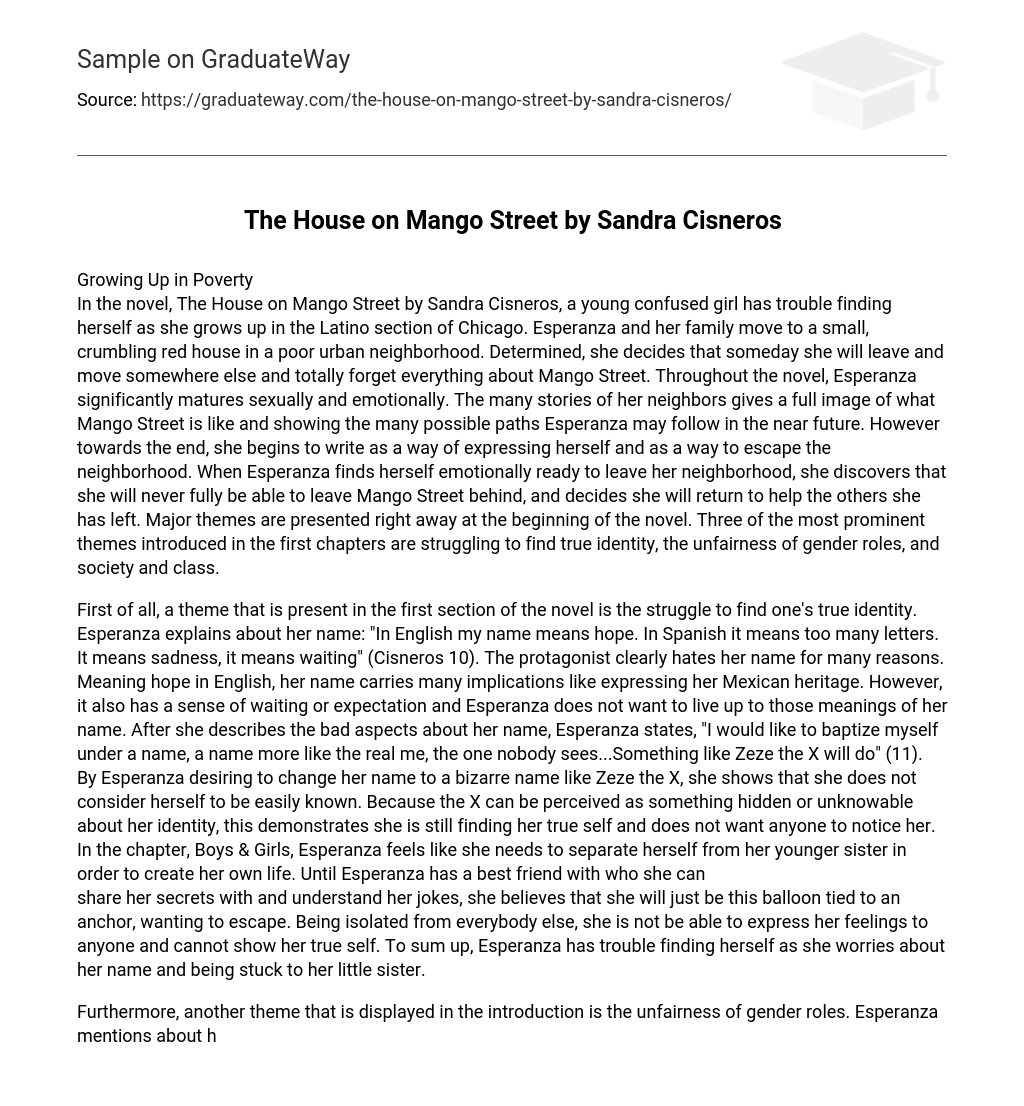The House on Mango Street by Sandra Cisneros tells the story of a young girl who struggles to discover her identity while living in the Latino community of Chicago. Esperanza and her family relocate to a dilapidated red house in a disadvantaged urban area. Resolute, she resolves to one day leave Mango Street behind and start anew somewhere else. As the novel progresses, Esperanza undergoes a profound growth, both sexually and emotionally.
The numerous accounts of her neighbors provide a comprehensive portrayal of Mango Street and illustrate the various potential paths that Esperanza might take in the near future. Nonetheless, as she nears the end, she starts writing as a means of self-expression and a means of escaping the neighborhood. Upon emotionally preparing herself to depart from her neighborhood, Esperanza realizes that she can never completely abandon Mango Street and resolves to return and assist those she left behind. The novel introduces major themes right from the start, with three of the most prominent themes being the struggle to discover one’s true identity, the inequity of gender roles, and society and class.
The initial section of the novel explores the theme of grappling with one’s true identity. Esperanza conveys her sentiments about her name: “In English my name means hope. In Spanish it means too many letters. It means sadness, it means waiting” (Cisneros 10). The protagonist vehemently dislikes her name for various reasons. Despite signifying hope in English, her name encompasses connotations of her Mexican heritage. However, it also implies waiting or anticipation, which Esperanza does not desire to embody. Following her critique of her name, Esperanza expresses, “I would like to baptize myself under a name, a name more like the real me, the one nobody sees…Something like Zeze the X will do” (11).
Esperanza’s desire to change her name to Zeze the X indicates that she does not view herself as easily recognizable. The inclusion of the X suggests an element of mystery or anonymity in her identity, implying that she is still discovering her true self and prefers not to draw attention to herself.
Esperanza in the chapter “Boys & Girls” desires to establish her own identity separate from her younger sister. Without a close friend to confide in and share her experiences with, she feels trapped like a balloon tied to an anchor yearning for freedom. This isolation prevents her from expressing her emotions and being true to herself. Ultimately, Esperanza struggles with self-discovery as she obsesses over her name and being tethered to her sibling.
In addition, the introduction highlights the injustice of gender roles. Esperanza mentions her great-grandmother, who, like her, was born in the Chinese year of the horse – a year believed to bring bad luck for females. Esperanza acknowledges that being born in this year does not necessarily bring misfortune but rather reflects the disapproval of strong women by Mexican and Chinese cultures. These two cultures, among many others, confine a majority of their women to domestic tasks while men engage in meaningful work. Esperanza vividly portrays her great-grandmother’s loss of freedom as she spent her entire life looking out the window, much like countless women who bear their sadness on a single elbow.
The House on Mango Street features a series of women who were confined by men, society, and their own feelings of failure, starting with Esperanza’s great-grandmother. Initially, she was a resilient woman, but she became stuck watching the outside world from a window and longing for liberation after an arranged marriage. Regarding the dynamics between boys and girls on Mango Street, Esperanza observes that they inhabit distinct realms.
The characters in the novel show divisions between genders, even at a young age. This reflects real-life situations that exist in society during that time period, as they live in separate worlds. Ultimately, the beginning of the novel highlights the theme of unfair gender roles in society.
Last of all, the initial chapters also highlight the theme of society and class. Describing her house, Esperanza mentions, “Out back is a small garage for the car we don’t own yet and a small yard that looks smaller between the two buildings on either side.” This depiction of her home provides indicators of their social status. Clearly, her family resides in destitution as they inhabit a low-quality dwelling in the poverty-stricken Latino neighborhood of Chicago. When a nun from Esperanza’s school visits her house, she remarks, “You live there? The way she said it make me feel like nothing.”
In that location, I resided. I nodded.” She feels greatly criticized by the woman who must reside in a significantly higher social class. The manner in which she utters the word there informs Esperanza that there is something amiss with her dwelling. Shortly after, Cathy clarifies to Esperanza the reason her family must relocate and informs her that the community is deteriorating. Cathy’s remark about the inadequate quality of the neighborhood appears as an offense to Esperanza, who has recently moved in. This demonstrates the impoverishment of the neighborhoods on Mango Street as Cathy’s family departs from one. Ultimately, Mango Street serves as the optimum illustration to convey the theme of society and class.
In the opening of the novel, three themes are introduced: the quest for self-discovery, the injustice of gender expectations, and the impact of societal divisions. It is crucial for readers to grasp these early themes as they permeate the entire book. By recognizing these underlying messages, readers can establish personal connections to the story.
The story depicts how the themes manifest as Esperanza matures and transitions into adulthood during her time on Mango Street. She realizes that relying too heavily on men can have a detrimental impact on her life.





